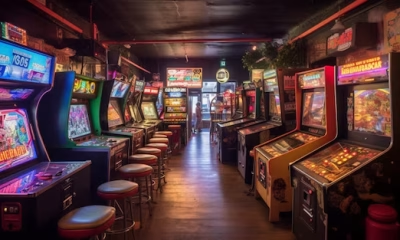Asia has a long and complex history of gambling, stretching back thousands of years. The varied origins of gambling across the continent show the rich cultural diversity of the area.
From ancient Chinese games to Japan’s pachinko parlors, the story of gambling in Asia offers a fascinating glimpse into how traditional pastimes can influence the modern gaming sector.
The Origins of Gambling in Asia
There isn’t a single origin of gambling in Asia, as each of the Asian countries has a rich history of gaming and gambling dating back many years. China, Thailand, Japan, and India have particularly intriguing gambling histories.
China
China’s gambling history is extensive, beginning around 2300 BCE. Early Chinese civilizations introduced games of chance, many of which laid the groundwork for today’s most popular games.
Mahjong, a tile-based game combining skill and luck, was first formalized during the Qing Dynasty (1644 – 1911 CE), but it traces back centuries. Playing cards were invented during the Tang Dynasty (618 – 907 CE) and gradually spread throughout Asia and the rest of the world.
China also has a long history of lottery-type games. The Keno lottery originated during the Han Dynasty (206 BCE – 220 CE) and was believed to be used to fund government projects like the construction of the Great Wall of China.
These early forms of gambling show the region’s affinity for games of chance and shaped many gambling activities across the world.
Thailand
Although gambling is illegal in Thailand, many people in the country enjoy games of chance. According to ReadWrite TH, there are several reputable offshore casinos that people in Thailand can access that prioritize player safety and offer a variety of games. These sites accept a wide range of payment options, including cryptocurrency.
Despite gambling being prohibited, Thailand has a complex history with the activity.
One of the oldest forms of betting in the country involved animal fights, particularly cockfighting. This dates back to the Ayutthaya Kingdom (1351 – 1767 CE). As culture developed, so did the games.
Today, betting activities remain popular, especially on lottery draws and Muay Thai fights. However, the government is strictly regulating gambling to protect cultural values, with only betting on the government-sponsored lottery and horse races allowed.
Japan
Japan’s gambling history can be traced back to the Edo Period (1603 – 1868 CE). During this time, popular dice games like “Cho-Han” were incredibly popular.
Since then, Japan has developed a fascinating gambling industry, with pachinko being one of the most popular games. This game originated in the early 20th century and combines aspects of slot and pinball machines.
India
India also has a longstanding connection to gambling, with mentions in ancient texts, like the Mahabharata, hinting at it. Written more than 2,000 years ago, this epic includes stories of kings engaging in high-stakes games and playing dice. It highlights the significance of these types of games in Indian society.
Games involving dice were also widespread in India throughout the years and are still enjoyed as a pastime in some of the more rural parts of the country.
Colonial influence introduced lotteries and betting on horse races, which remain popular today. However, the legal landscape around gambling is restrictive, with most betting activities prohibited. Exceptions do exist for games that rely on skill and not luck. Today there are only three states that house casinos in the country.
Asia’s Modern Relationship With Gambling
Gambling in Asia has grown into a multi-billion-dollar industry, although there are some countries where it remains prohibited.
Singapore and Macau have become global gambling destinations, attracting millions of tourists to the casinos each year. Macau, referred to as the “Gambling Capital of the World” often overtakes Las Vegas in gambling revenue thanks to its world-class casinos and resorts.
However, gambling in many countries, like Thailand and India, remains illegal, despite these countries historically contributing to modern casino games. The governments of these nations often claim to ban gambling to protect societal values and prevent gambling addiction.
The internet has also transformed the gambling landscape in Asia, with online gambling increasing in popularity—even in countries where there are strict gambling laws.
Most Popular Forms Of Gambling In Asia
Gambling preferences are diverse, with each country favoring specific forms of gambling:
- Casino games: Casinos are a major attraction in Singapore and Macau, and less so in Cambodia and Malaysia where mainly tourists partake. Asian casinos offer a variety of games, including slot machines and traditional card games. Baccarat is especially popular with Chinese gamblers.
- Lottery and Keno: Lottery-style games are popular throughout Asia, especially in countries where state lotteries have been legalized. Keno variants are also preferred by players looking for simple, fun games.
- Pachinko: This game is historically linked with Japanese gambling culture. Although not officially classified as a traditional form of gambling, pachinko parlors can be found throughout Japan.
- Sports betting: Sports betting has strong support throughout Asia, especially in cricket (India), Muay Thai (Thailand), and horse racing. Online sports betting is also rising in popularity, especially in markets where gambling is restricted.
- Mahjong: Mahjong is one of the most popular games in China and East Asia. The tiles are often seen at family gatherings, but there are also several high-stakes Mahjong tournaments.
Final Thoughts
The history of gambling in Asia is as diverse as the people that live on the continent. From ancient origins in traditional games of chance to the modern casino resorts in Macau and online casinos, gambling has continuously transformed along with human preferences and technological advancements.
Several countries have legalized gambling in an effort to drive tourism and economic growth, however, others have adopted strict regulations to protect societal values.
Asia’s gambling industry is likely to continue to transform as more technologies emerge, hopefully merging modern innovation with traditional games.

- Megaways vs. Retro Slots: Which Are Better?
- Treasure In Your Attic? The Most Sought-After Retro Games
- Reliving the Golden Era of Gaming with PlayRetroGames.com
- Remembering some of the worst retro games ever made
- Top Picks: The Best Retro Games to Play Online
- Rediscover the Magic: Retro Games Unleashed!
- From 8-Bit to High Stakes: The Retro Gaming Roots of CS:GO Case Battles
- The Best Retro Themed NFL Video Games
- 12 of the Most Influential Chinese-Themed Retro Games
- The Role of Sound and Graphics in Online Casino Games
- The Enduring Appeal of Classic Table Games in Online Gaming
- Why Super Puzzle Fighter Was a Precursor to the Age of Casual iGaming
- Top Online Casino Providers: A New Era in Gambling
- The Evolution of Fast Payouts in Gaming: From Retro Classics to Modern Platforms
- A nostalgic revolution among retro gamers: Migrating to the thrills of online casinos
- The Increasing Role of Apps in Online Gaming
- How Retro Games Are Evolving to Match A More Mobile Gaming Industry
- Retro Game Elements in Today’s Online Casino World
- Hidden Levels and Easter Eggs in Retro Games
- Benefits For CS2 Players From CS2 Armory Pass
- The History Of Gambling In Asia
- Retro Video Game Mechanics in Casino Games
- Most Popular AK-47 Skins in CS2 and Their Prices
- The Psychology Behind Online Gambling: Why We Keep Coming Back
- Casual vs. Risky Plays: Balancing Fun with Crash Games and Retro Slots
- From 80s Arcades to Online Casinos: How Retro Video Games Inspired Modern Casino Games
- Why Poker Has Stood the Test of Time
- Tower.bet Loyalty Program: How to Earn Extra Bonuses
- What is the appeal of playing retro games?
- How Live Streaming is Revolutionizing Sports Betting
- Classic Retro Casino Slots
- Esports Tournament to Look and Bet On
- The Impact of Online Gambling on Traditional Casinos
- How to Choose the Right Casino Game for You: A Personality-Based Approach
- Exploring the Impact of Retro Gaming on Modern Game Design
- What Retro Slots Are Available at Online Casinos?
- Overview of Buying WoW Boosts for DF Mythic Dungeons
- Why Are Retrogames Popular?
- Pixelated Nostalgia: Ontario’s Retro Arcade Revival
- The Greatest Retro Gaming Moment In Movie History
- Nostalgia and Retro Revivals: The Resurgence of Classic Casual Games
- Best Dota 2 Carry Heroes in 7.35d
- The Best Video Game Remakes & Remasters of 2024
- How Online Gaming Can Impact Your Mental Health Positively
- History of casinos: When and who invented casino?
- Why Retro Games Are Still On Trend In 2024
- Best Online Casino Games in Retro Style
- How to Find People to Play Games With: Guide to Finding Your Gaming Friends
- The Growing Trend of Sports Betting in Online Casinos
- Mobile Gambling in 2024: Navigating the Digital Future with PokieSurf


















































































































